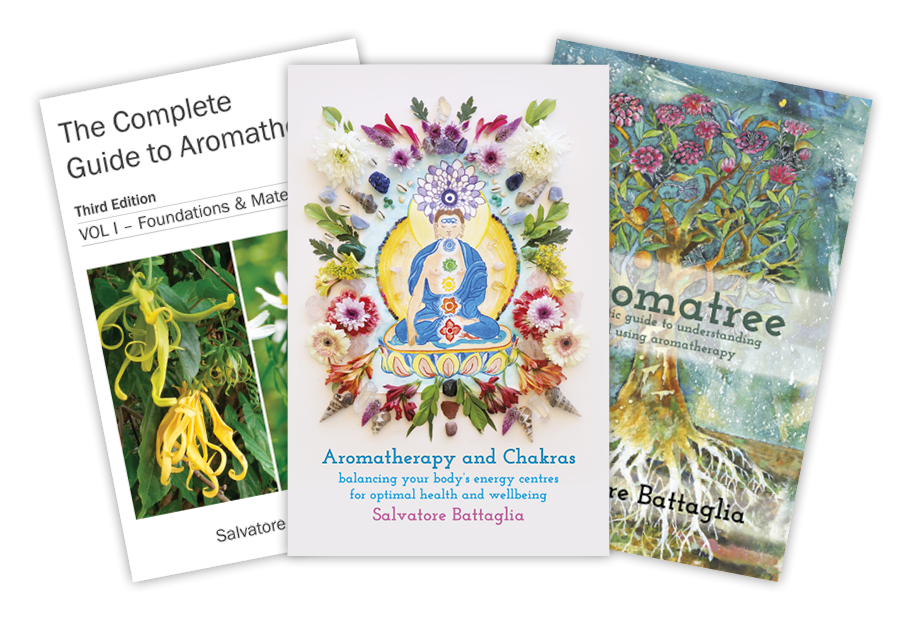I do not wish to reflect on the past for too long; however, it is hard to believe that this time last year we were about to experience some of the strictest lockdowns to combat the spread of covid19. Many of us thought that it would only be a short-term challenge. Life in Australia is slowly resuming some degree of normality as we have managed to prevent community infection, however, many parts of the world are now dealing with a third lockdown. I do sincerely hope that we are able to curb the spread of infection everywhere so that life can resume some sense of normality in those countries still affected by high rates of community infection. Our thoughts and prayers are with you.
Indeed, one of the reasons I decided to complete Volume III before Volume II of The Complete Guide to Aromatherapy was the lockdowns we experienced last year.
In writing Volume III, it was my vision to present a different perspective on what we traditionally refer to as subtle aromatherapy practices. I have so much respect and admiration for the many authors and aromatherapists who have significantly contributed to the practice of subtle aromatherapy. Indeed, I believe that essential oils are among the most potent therapeutic remedies to elicit a more subtle therapeutic outcome. Many of us involved in Complementary and Alternative Medicine (CAM) find it easy to intuitively embrace the principles of subtle aromatherapy; however, some may scrutinize and challenge these concepts and suggest that they lack any scientific basis.
I do not for one moment purport to provide the all the scientific basis for subtle aromatherapy. However, I do believe that Volume III opens new doors to understanding how we can understand the practice of aromatherapy within a spiritual framework, and indeed why recognizing the importance of the spirit is important to elicit healing.
In Volume III, I have set about to methodically establish a framework to take us on a journey of discovery to understand the influence of essential oils on our psyche and subtle.
Over the coming weeks I wish to explore various chapters of the book before the official book launch in May. We will have a face-to-face event in Brisbane and a special online event. The online event can be then accessed at a time convenient for you to view. By the way, if you register for the online book launch, we will not be charging any postage when you order the book, no matter where you are in the world.
There are eleven chapters in Volume III:
1. Re-shamanising Aromatherapy
2. Spirituality
3. Sacred Scents
4. Spiritual Dimension of Scent
5. Biofield Therapies
6. Mindfulness
7. Aromatherapy, TCM, Systems Biology and Personalised Medicine
8. Olfaction
9. Neuropsychopharmacology of Essential Oils
10. Aromatherapy and Mental Health
11. Essential Oil Subtle Profiles
This week we will explore the first two chapters – Re-shamanising Aromatherapy and Spirituality.
In Chapter One – Re-shamanising Aromatherapy, I explore the role of traditional shamanic practices, we explore how shamanic practices have influenced and how we can integrate concepts of shamanic practices into our contemporary healing practices. We explore the neurobiology of shamanic practices and examine the role of entheogens. In this section I suggest that while essential oils do not elicit any hallucinogenic effects associated with other botanicals used to elicit altered states of consciousness, essential oils can still be considered psycho-integrators as they stimulate the integration of brain information processing functions and enhance integration of the limbic system processes and neuro-cortical processes.
In this chapter I explore the concept of ‘loss of soul’, a term commonly used within shamanic practices and indeed many practices such as aromatherapy that mandate more subtle and spiritual elements may be a catalyst for any imbalances and disharmonies of the body, mind and spirit.
I highlight the important of protecting indigenous rights and issues of cultural appropriation. I refer to the advice of indigenous elders and scholars who outline ways in which we incorporate elements of shamanism into our healing practices. Indeed, I was inspired by the wisdom of David Tacey in his book, Edge of the Sacred – Jung, Psyche, Earth who states that consuming Aboriginal cosmology is an example of the most recent imperialist appropriation of Aboriginal culture. Tacey suggests we need to develop a kinship with the land, and Aboriginal cosmology may best serve as an inspiration to create our own cosmology. I do discuss this in much more detail in my book.
I conclude Chapter One by suggesting that essential oils have always played a very important catalyst in healing, renewal, strength and enthusiasm for life and that aromatherapy may be the way forward to re-awaken the shaman within us all.
In Chapter Two – Spirituality, I explore the meaning of spirituality, we examine the research linking wellbeing and health to spirituality and examine the challenges of integrating spirituality into mainstream health care practices.
We so often refer to spiritual elements within our aromatherapy practice; however, what do we exactly mean by this. In this chapter we explore the meaning of spirituality and practical ways we can introduce it into our practice.
We examine the works of researchers such as Tanyi, Swinton and Koenig who provide us with high-quality research and clinical studies that confirm the impact of spirituality on our physical and mental health. We explore the impact of spirituality on our mental health and investigate how the New Age movement came to embrace spirituality.
The information in Chapter Two provides us with very important foundations for the chapters that follow.
Volume III is the text book for this year’s advanced aromatherapy course – Exploring the spiritual dimension of aromatherapy. You can enrol in this incredible course which includes six masterclasses by joining the Aromatree community. The fee to join the Aromatree community includes attendance of all six masterclasses as well as a copy of The Complete Guide to Aromatherapy – Volume III, along with many other benefits.
Next week we will explore Chapters Three and Four in which we examine the role of scent in traditional spiritual practices and I share with you a holistic model that I propose that helps us understand the pathways by which essential oils work at a spiritual level.


